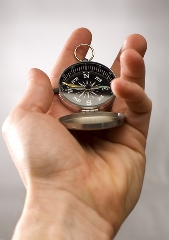I had an old friend who was a software programmer in San Jose. At the time I knew him, he’d held several jobs in a few years. He told me he wasn’t happy in his newest job and wanted to find a new one. Again.
“Are you moving toward a new job,” I asked, “or running away from your current mess?”
“Well,” he said, “if I’m honest with myself…I suppose I’m running away.”
“That’s too bad,” I said, “because there was obviously some lesson you missed while there, some mistakes you’ll probably repeat. I suggest you stay and learn the lesson so you can move toward something—otherwise, we’ll be having this exact same conversation in another year when you’re looking for your next job.”
Despite my sage advice, he left anyway, and started a new job…which he recently lost.
Same story, different day.
The trick here is to be honest with yourself. If you’re getting married, it’s easy to say you’re moving toward a relationship—but you might be moving away from being alone. That’s a very different reason to get married, and not a very good one. How many divorced and/or miserable people are out there raising their hands on this one?
You will find that almost EVERY bad decision follows from a violation of a value—a moving away from a fear instead of moving toward something you love.
So you’ve made some good decisions, and you’ve made a few lousy ones. Welcome to the human race. But what can you learn from your personal history to improve the ratio of good to lousy?
Let’s do an autopsy on the decisions you’ve made that have killed deals, killed relationships, reduced your success, and otherwise created general chaos in your life:
You needed to meet a goal or quota, so you did the wrong thing by the client. You thought the client and your boss wouldn’t notice. That didn’t work. You violated your value of always doing the right thing by the customer, and a bad result was your reward.
You had to get home early to meet with friends, so you didn’t double-check that project before sending it out to the client. You lost the deal because you didn’t uphold your value of quality work. Again, bummer result.
You were in a pinch to fill a position, so you hired someone you knew just didn’t share your values. Twenty-four hours after the start time, you know you have a problem.
In each of these cases, you made a decision that deep in your gut felt wrong before you even made it. That butterflies-swirling-like-a-flush-down-the-porcelain-bowl feeling is all that’s needed to know for certain that we blew it.
Let’s make this easy. Psychologists tell us that all emotions are rooted either in love or in fear. Anger, for example, is a symptom of fear. You can’t be angry if you’re not afraid. Joy is based in love. You can’t feel bliss without having love at the core. Fear is a “moving-away-from” emotion. Love is “moving-toward.”
Analyze the disastrous decisions you’ve made, and a pattern of “moving away” from something will generally emerge.
• Moving away from missing a quota.
• Moving away from confronting a problem.
• Moving away from one company or boss as opposed to moving toward a bigger calling—thus, the saying, “Out of the frying pan, into the fire.”
So the next time you need to make a decision, ask yourself if you’re moving away from something or moving toward something. Once you master that assessment, it’s amazing how much better your decisionmaking, and your results, will become.
